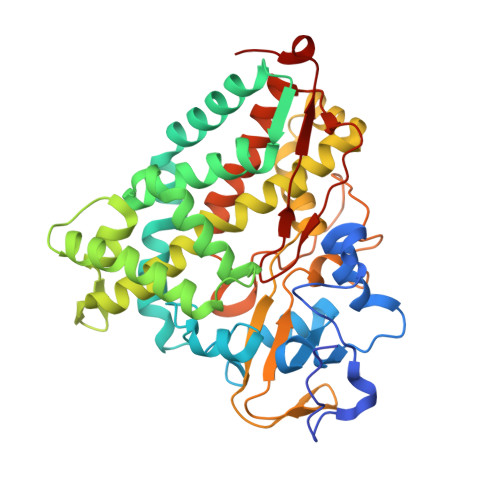Crystal structure of the cytochrome p450cam mutant that exhibits the same spectral perturbations induced by putidaredoxin binding.
Nagano, S., Tosha, T., Ishimori, K., Morishima, I., Poulos, T.L.(2004) J Biological Chem 279: 42844-42849
- PubMed: 15269210
- DOI: https://doi.org/10.1074/jbc.M404217200
- Primary Citation of Related Structures:
1T85, 1T86, 1T87, 1T88 - PubMed Abstract:
The cytochrome P450cam active site is known to be perturbed by binding to its redox partner, putidaredoxin (Pdx). Pdx binding also enhances the camphor monooxygenation reaction (Nagano, S., Shimada, H., Tarumi, A., Hishiki, T., Kimata-Ariga, Y., Egawa, T., Suematsu, M., Park, S.-Y., Adachi, S., Shiro, Y., and Ishimura, Y. (2003) Biochemistry 42, 14507-14514). These effects are unique to Pdx because nonphysiological electron donors are unable to support camphor monooxygenation. The accompanying 1H NMR paper (Tosha, T., Yoshioka, S., Ishimori, K., and Morishima, I. (2004) J. Biol. Chem. 279, 42836-42843) shows that the conformation of active site residues, Thr-252 and Cys-357, and the substrate in the ferrous (Fe(II)) CO complex of the L358P mutant mimics that of the wild-type enzyme complexed to Pdx. To explore how these changes are transmitted from the Pdx-binding site to the active site, we have solved the crystal structures of the ferrous and ferrous-CO complex of wild-type and the L358P mutant. Comparison of these structures shows that the L358P mutation results in the movement of Arg-112, a residue known to be important for putidaredoxin binding, toward the heme. This change could optimize the Pdx-binding site leading to a higher affinity for Pdx. The mutation also pushes the heme toward the substrate and ligand binding pocket, which relocates the substrate to a position favorable for regio-selective hydroxylation. The camphor is held more firmly in place as indicated by a lower average temperature factor. Residues involved in the catalytically important proton shuttle system in the I helix are also altered by the mutation. Such conformational alterations and the enhanced reactivity of the mutant oxy complex with non-physiological electron donors suggest that Pdx binding optimizes the distal pocket for monooxygenation of camphor.
- Department of Molecular Biology, University of California, Irvine, CA 92697-3900, USA.
Organizational Affiliation:




















